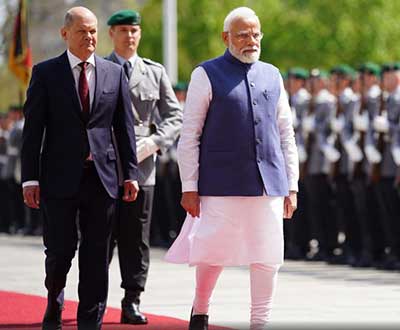Relevance: GS-2: Bilateral, Regional and Global Groupings and Agreements involving India and/or affecting India’s interests.
Key Phrases: Democratic alliances , Indo-Pacific guidelines, Geopolitical,Diplomatic chessboard,India-Germany Inter-Governmental Consultations (IGC), a biennial format,emerging multipolarity.
Context:
- Recent visit of Prime Minister to Germany comes at a critical time due to the ongoing Ukraine war.
- New Delhi has been assertive, with no change in its stance on Russia despite US’ and the European nations’ sanctions on Moscow and military aid to Ukraine.
- For instance, it has abstained from critical votes in the UN on Moscow and continues to engage with it to increase the import of cheap crude. Also, its long-standing and traditional defence links with Russia remain intact. Although, India has repeatedly called for a ceasefire and a return to dialogue and diplomacy.
- But, this act of balancing has invited criticism from the west. However, New Delhi insists that its position on the war is non-partisan and should be appreciated by its allies and friends.
Key Highlights
- For a Nuanced Stance
- There is a growing recognition in India’s strategic circles that New Delhi has to bring more nuance to its approach to Europe.
- With an assertive neighbouring China on the world stage, New Delhi needs to manage a delicate balancing act while asserting its right to pursue its national interests and strategic autonomy in foreign policy. India can’t afford to be isolated by the west.
- It is against this backdrop that the 3-nation Europe tour (Denmark, France and Germany) of the PM becomes important.
- Despite the delay, European nations stand together to condemn Russian aggression against Ukraine. India’s abstention in the UN votes and the continuation of its relationship with Russia have raised concerns in Germany.
- India’s role as a major power and largest democracy is being discussed and there is a growing expectation that India must shift its position on Russia and join hands with the European countries and the U.S. in protecting democracy.
The Growing Importance of The Indo-Pacific For Germany
- Prior to PM’s visit, the Chancellor had visited Japan, on his first visit to Asia. This is a symbol of building democratic alliances as per Germany’s Indo-Pacific guidelines.
- These two meetings have raised expectations among analysts of Germany of a democratic dividend that may lead to a convergence of views and possible policies on Russia between the two countries.
- However, New Delhi has chosen to prioritise its interests over pursuing a policy that is shaped by common democratic values that define Germany, Japan and India.
The China Factor
- Indian policies have resisted promoting democracy in the neighbourhood
and have instead opted to deal with de facto powers.
- The only exception of Afghanistan, where India is still reluctant to do business with the Taliban.
- India’s policy towards Myanmar’s junta is defined by this pragmatism.
- Therefore, the rationale of a convergence of interests to protect democratic values should not be a solid binding chord between India and Germany.
- The geopolitical convergence of countering the rise of China particularly in the Indo-Pacific seems to be a more compelling necessity rather than the aspects of protecting democratic norms and values.
Engagement With Europe
- New Delhi’s objective is multifaceted as far as its relations with
Europe in general and Germany, in particular, are concerned.
- It has not revised its position on Russia and Ukraine, by continuing to underline its unequivocal condemnation of the violence.
- However, unlike the West, India makes it clear that irrespective of its position on a solitary issue of geopolitical relevance, the bilateral engagement with the 3 countries remains at the top of its priority.
- The purpose of such a policy is to present itself as not being isolated but as a swing power that can move deftly on the geopolitical and diplomatic chessboard.
- Holding of the sixth India-Germany Inter-Governmental Consultations (IGC), a biennial format which India conducts with Germany, India reiterates its commitment to mutual beneficiary relations.
- India attaches significant importance to the ‘long-standing commercial ties with Germany, an important pillar of the ‘Strategic Partnership’, which the two nations entered into in 2000.
- The idea is to highlight the convergence of issues of economics, technology and climate change (low hanging fruits), in spite of the intensifying dissonance on democratic and strategic issues. This remains the crux of the Indian approach.
There is Room For Full Ties
- Lack of understanding of each other’s strategic cultures and domestic
politics.
- Which doesn't allow India-Germany relations to achieve their full potential.
- Germany has invited the PM to the G-7 meeting in June this year
- It reflects the emerging multipolarity in the international system,
- This provides space for major powers (Germany and India) to play a greater role in bringing peace and stability in other theatres, particularly in Afghanistan and the Indo-Pacific.
- In times of shifting geopolitical alliances and realignments, India and Germany can emerge as important poles in shaping the new world order.
Source: The Hindu
Mains Question:
Q. What are the recent developments in Indo-German relations? Highlight the recent issues and suggest a suitable way forward.








